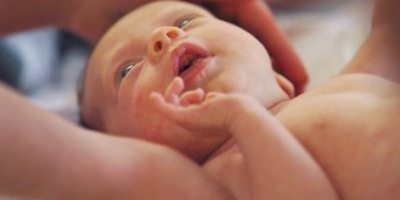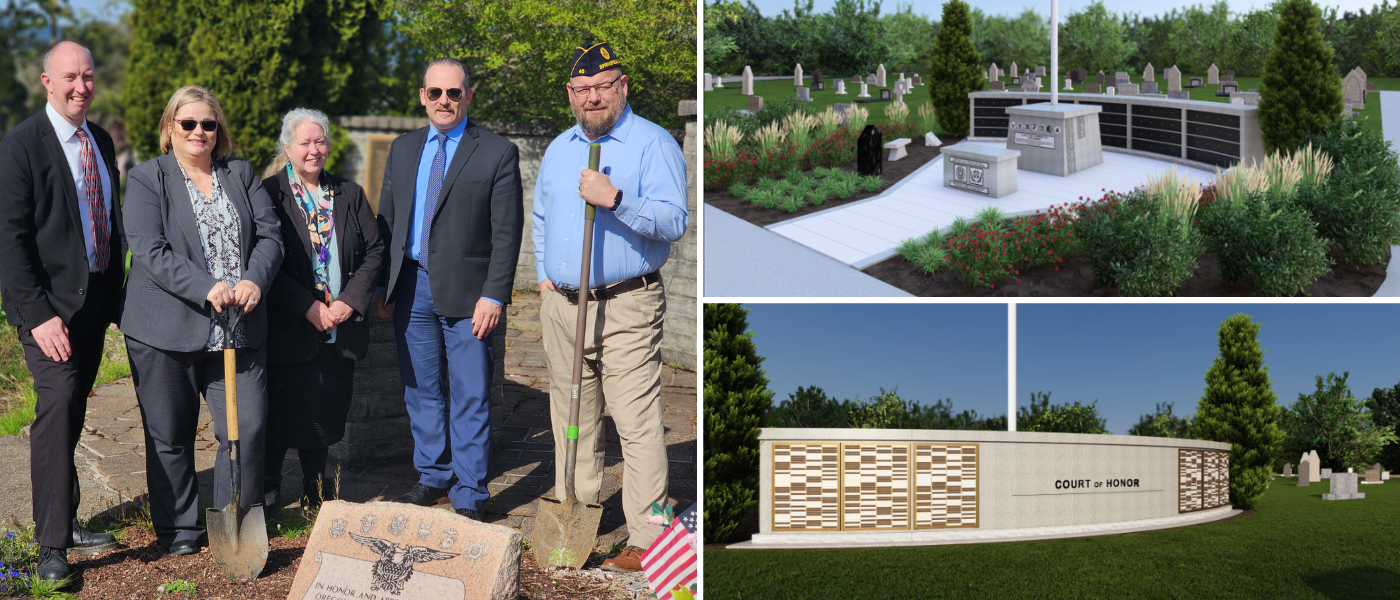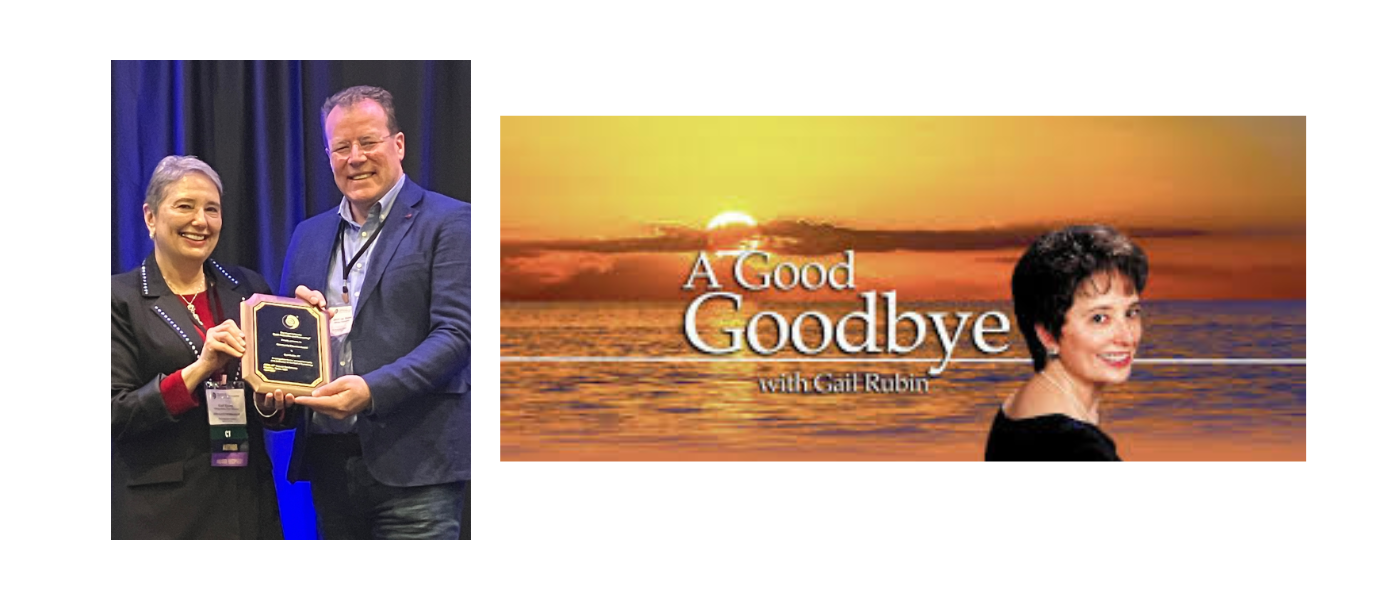Carrollton Couple Finds Support to Deal with Unborn Son’s Terminal Condition

Editor’s note: Facing death can be hardest for a family expecting new life. Perinatal hospice offers choices and resources for parents when an infant’s death is imminent. This is one North Texas family’s story.?
A black gap marred the middle of the computer screen. The void split a cloud of light that ebbed and flowed into the shape of a human fetus.
The sonogram technician turned from her computer screen to Deidrea and T.K. Laux. She told them she saw problems.
T.K. stopped thumbing his BlackBerry. He had just messaged everyone they knew the good news that their child was a boy. Now, he ignored the buzzing of congratulatory responses.
The technician slowly traced a black gap in the center of the screen with a computer arrow. What they were seeing, she told them, was their baby’s cleft lip.
OK, Deidrea said to herself as she caught her breath, we can deal with this. She shifted into planning mode as the technician kept rolling the sonogram wand over her bare belly.
T.K. felt sucker punched. His eyes welled. One of his cousins, born with a cleft lip, still struggled through surgeries at 30.
The technician turned back and focused on the screen for what seemed like hours. The baby’s kidneys looked swollen, she finally said, another bad sign. She excused herself to get the Lauxes’ obstetrician.
The Lauxes later would recall that their doctor’s examining room felt claustrophobic. Reclining on the narrow examining table with her belly still exposed, Deidrea kept telling her husband that pediatric urologists fixed kidneys and plastic surgeons fixed lips.
T.K. squeezed Deidrea’s leg and fought tears. How could this be happening, he asked, to their baby boy ? to them?
Every question from that moment on would be shattering: What could faith do when medicine offered no hope? What separated surrender and suffering? If survival was only a matter of hours or days, how much life would be enough?
Problem-solver
Deidrea had been a missionary, translating for medical teams in Guatemala. She helped deliver babies in remote villages and even hammered together a wooden casket and helped bathe an infant for burial. Now, she was a troubleshooter for an office-furniture firm, manicured, highlighted and suburban fashionable. Her Third World experience still showed in her calm when others were in crisis.
As they waited, she mentally mapped out plans to call every doctor she knew and line up the best treatments.
T.K. was a doer, a big, goateed man whose shaved head made him look like Mr. Clean. He was happiest renovating their sun-washed Carrollton home and working as an electrical technician. Even his nickname was big and funny ? initials from a former business he’d called TKO or “Technical Knockout” Welding.
He’d met Deidrea a year and a half before, teaching her scuba diving class at a diving water-park near Dallas. He made her blush by introducing himself with a quip as she struggled with an air tank: “Can I turn you on?”
He’d been in overdrive since they learned they were expecting. He sold his pickup to start a college fund and ripped out carpet from an upstairs room for a nursery. Now, he had no idea how to help his baby boy.
The obstetrician, Dr. Cindy Hartley, stepped into the examining room. She scanned the pulsing images of the Lauxes’ 20-week-old fetus and said she’d have a perinatologist see them that afternoon.
That same day in February 2008, the Lauxes learned about trisomy, an error in DNA sequencing that gave their baby an extra chromosome.
Trisomy 21, the most common, causes Down syndrome. It appeared from the sonogram that the Lauxes’ son had a rarer anomaly ? trisomy 18 or 13. Either causes such profound abnormalities that children usually live only hours or days, if they survive birth.
In addition to the cleft lip, the Lauxes’ son had visible swelling around the kidneys and clearly developing heart valve defects. His eye sockets were also too close together, a sign of brain abnormality.
It wasn’t that the Lauxes had done anything wrong, doctors told them, or that they were older parents ? T.K. at 51 and Deidrea at 38. Trisomy 13 and 18 are random chromosomal glitches. The doctors laid out probabilities and said they’d support the couple whether they opted to continue or end the pregnancy.
Deidrea felt like she was having an out-of-body experience as she heard herself say that they’d already agreed to love any child God gave them.
The doctors’ careful phrases looped in T.K.’s head ? “incompatible with life,” “usually fatal,” “option of termination.” If their baby wouldn’t survive the pregnancy, he blurted, why continue? How could they let their baby suffer and put Deidrea at such risk?
Hours later, Deidrea couldn’t sleep.
Alone on their living-room couch at 3 a.m., she prayed: Why them? What now? How could she and T.K. come together ? not apart?
She felt a flutter in her belly.
She mouthed the name that she and T.K. had settled on just before the sonogram that morning, what now seemed a lifetime ago. Thomas was for T.K., whose given name was Thomas. Gordon honored her grandfather, who died only weeks before she and T.K. learned that they were pregnant.
Thomas, she said to the darkness. Thomas Gordon Laux.
The movement in her belly was unmistakable. Thomas kicked hard.
It felt like answered prayer.
Dedication
Deidrea and T.K. stared out at the cavernous, packed sanctuary of Bent Tree Bible Fellowship.
Pastor Pete Briscoe told the congregation that the Lauxes were newlyweds, married 10 months earlier.
On this first Sunday in May, they wanted to dedicate their unborn son to God.
In a shaky voice, Deidrea described the bleak February day that she and T.K. learned of Thomas’ condition. Feeling her son’s movements in the long night that followed, she knew that God was with them and they wouldn’t be alone.
When she explained Thomas’ diagnosis to her fifth-grade Bible study group, the girls asked if it was OK to pray for a miracle.
“The miracles have been happening every day,” Deidrea told the congregation, “when we feel our son moving and he’s growing.”
The Lauxes understood that their sadness and joy were inseparable, and they could choose to celebrate every moment they had with their son.
Every morning, T.K. brought his wife breakfast in bed and nestled near her belly for father-son talks. He imagined aloud that Thomas was scuba diving, four-wheeling, playing soccer. Thomas kicked and spun at the sound of T.K.’s voice, clearly alive ? here and now.
“We’re so grateful that God chose us to be his parents, because he is such a special little boy,” Deidrea told the congregation as T.K. nodded beside her. “We’re telling God, ‘Thank you ? thank you for this gift.’ “
Funeral home
Deidrea dialed the funeral home’s number just after her best friend called, giddy about buying $4,000 in nursery furniture for her soon-to-be-born baby girl.
What they spent on furniture, T.K. said, we’ll spend on a burial. Deidrea couldn’t bear looking at baby clothes, yet they were going shopping for a tiny casket. It was little comfort that they would be visiting the Wills Point funeral home that had buried Deidrea’s grandfather the previous fall.
Clutching her cellphone, Deidrea nearly lost it when she heard a woman with an East Texas twang say the funeral home’s name.
So she and T.K. carefully planned the day they’d go there in early June.
First, they would see their obstetrician for a 38-week checkup. Then they’d visit Deidrea’s grandfather’s empty home in the Van Zandt County town of Edgewood. That would be prelude for driving a few miles east to the funeral home and then to the Oak Hill Cemetery in Edgewood.
On that June morning in Dr. Hartley’s office, a new sonogram was comforting. Thomas weighed 51/2 pounds. The Lauxes joked that their son’s head looked like Charlie Brown’s.
They laughed easily as they shared stories with Dr. Hartley. Thomas bounced when Deidrea ate pizza or Popsicles. He kicked when he was poked. The Lauxes were so upbeat that the obstetrician sometimes had to remind herself of what was coming.
Deidrea tried to hide the sharpest edges of her grief. She confined her tears to mornings when she sat alone in a rocking chair to read her Bible and write to Thomas in her journal. She marveled at how she felt at once shattered and grateful, and how her heart broke a little more each time they told others about their son.
“So many people tell me my strength is an inspiration,” she wrote. “What they don’t understand is that it’s my love for you that has given me so much courage. When I cry I worry my sadness makes you sad, too ? that somehow you can tell when my heart aches. So I fight to be strong and positive, like in some way I’m giving you strength to fight.”
“Please fight for a little longer. Don’t give up ? stay with us long enough so we can memorize the wrinkles in your skin and the shape of your little toes. I want to forever know what it’s like to feel you grasp my pinky. Or how it feels to see you fall asleep on your daddy’s chest. I want to touch your chubby cheeks and watch you dream. Please don’t leave us, sweet boy.”
When the Lauxes walked in the funeral home, Deidrea clutched her thick, black-leather planner over her belly like a shield.
“In the womb, he’s normal,” Deidrea told the funeral directors, Dan and Karen Hiett. “His growth rate is normal. Everything is normal. The problem is, he has a fairly large heart defect. Outside the womb, he can’t survive.”
The Hietts led them into a paneled conference room. “The doctors have told us,” Deidrea continued, “there’s a 50 percent chance he survives the first week.”
“He could live 11 minutes, 11 days, 11 months ? we just don’t know,” T.K. added with a sigh. “That’s the hardest thing: not knowing.”
The Hietts gingerly explained the particulars of buying a funeral. The Lauxes wanted a small graveside service and a larger memorial later at their church. T.K. liked the idea of a concrete vault ? something big and strong to protect his little boy.
Dan Hiett guided them down a hall. “We’ve got a couple of caskets to show you,” he said. “We just want to pick the style, whether you want a metal versus ? “
“Camouflage!” T.K. declared.
Everyone laughed. T.K.’s grin widened as Deidrea gave him a mock-scolding look.
Dan Hiett ushered them into a viewing parlor. Two tiny blue caskets sat side-by-side against a back wall. One was satin-lined, powder-blue metal with gilt trim and chrome handles shaped like cherubs. The other was plain wood covered with gingham.
Deidrea flinched and stared. She turned her head, blinked tears and reached for T.K. He wrapped her in a hug.
“I’m so sorry,” Karen Hiett said. “I know this is the hard part.”
They picked the metal casket, and T.K. turned away and raised a finger to his temple like a gun. He jerked his finger as if pulling a trigger and winced. He sometimes didn’t know whether to pray for endurance or an ending. He shook his head as if to clear it as they stepped into another room to choose the vault.
“That wasn’t as miserable as I thought it would be,” Deidrea said as T.K. turned their SUV toward Oak Hill Cemetery.
“The casket thing was,” T.K. said. “I don’t think I’ve ever seen one for a baby. To be honest, I just hate funerals ? hate funerals. I always said I wouldn’t go to another one. Not even mine.”
He slowed inside the cemetery gate. They both looked left at a cluster of headstones shaded by a pin oak. Deidrea’s eyes lingered on the one still covered in dirt, her beloved grandfather’s grave.
The head of the cemetery association waited for them up the hill.
T.K. parked their SUV and they stepped into the late-afternoon heat. Staring down at a stone angel, he realized he was standing over a tiny grave.
“You see that?” he said, reading dates. “Three days. Three days.”
“‘She was not here long,’ ” he recited from the epitaph, ” ‘but will be loved forever.’ “
The cemetery official explained available plots and rules: A bench was fine if it fit on their plot. Crape myrtles and rose bushes were OK, but no deep-rooted trees.
“I never imagined this,” Deidrea said as T.K. kept pointing out children’s graves. “My husband said we went from college to caskets.”
The official agreed to hold several plots until after Thomas’ birth.
“I don’t want to give up,” Deidrea said. “What if there’s a miracle? We may have an 18-year-old son mad at us for picking out his grave right now.”
Deidrea asked T.K. to stop at her family plot on the way out. She stood longest over the graves of a great-uncle who died at 8 months after eating lye soap and a great-aunt who drowned in a farm pond at 12.
Until this cemetery visit, she and T.K. hadn’t grasped how many families faced losses like theirs. Now they understood why family elders lingered over these tiny graves with a sadness that never softened. Big gravestones marked full memories and lives. Small ones bounded unfinished futures and dreams.
T.K. patted her arm. “You OK?”
She curled into his side. “This was a big day.”
He nodded. “Sonogram, funeral plans.”
Coming Next Week: Baby Thomas arrives.
Watch Part 1 of a Video Series for this Story
Article By:LEE HANCOCK / The Dallas Morning News / lhancock@dallasnews.com
Note From Ryan:
I wanted to share this story because infant death is one of the hardest things to deal with in this industry. We all dread it and hope it never happens. But when the time comes we have to be strong and help the family grieve in a way that is joyful and can celebrate the life of their baby even if that life may be for only a few minutes like the situation in this story.
What do you say to someone in this position? How do you make the planning process more joyful? Please share your experiences.




